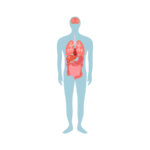By Bonnie Jenkins, Advanced Natural Wellness
A friend of mine called the other day in tears. It seems that her father had just been diagnosed with bladder cancer. Luckily, the doctor had caught it early – a good sign since the chances for survival are very good when the disease is found and treated before the cancer gains too much momentum. Nevertheless, my friend was understandably frightened.
Of course, cancer can be a terrifying diagnosis. For most men however, the focus has been on prostate cancer. But, while you might not hear much about it, bladder cancer is on the rise and is fast becoming a threat to men’s health. According to the most recent figures from the American Cancer Society, more than 60,000 new cases of bladder cancer will be diagnosed in the United States this year alone – making it the fourth leading cause of cancer among men. In fact, while women aren’t immune, men have a two to three times higher risk of bladder cancer than women.
The good news is that there are a number of things you can do to prevent the disease.
Healthy Changes
When most of us think of the effect smoking has on our health, we immediately think of heart disease and lung cancer. But smoking can be a huge risk factor for bladder cancer. The reason is that smokers have a high concentration of tobacco-related carcinogens in their urine – setting them up for a three- to fivefold increased risk of developing the disease.
But, while cigarette smoking appears to be an important risk factor for this disease, diet also appears to be key. Researchers from the University of California combined the results of 38 studies on the relation between diet and bladder cancer. They found that diets high in fruits and vegetables and low in fat reduces the risk.
Open your arteries, improve blood flow for a new health miracle...
Did you know your circulatory system has over 60,000 miles of arteries, veins and other blood vessels, if stretched end to end?
But as you age, your blood vessels undergo changes, which may cause them to stiffen, thicken and get clogged.
GOOD NEWS! Doctors have now identified a “Miracle Molecule” inside your arteries that helps OPEN your arteries and IMPROVE blood flow.
It’s what Dr. Valentin Fuster calls it, "One of the most important discoveries in the history of cardiovascular medicine."To you, that means...
- Healthy blood pressure
- Sharper mind and memory
- Skyrocketing energy and muscular strength
- Increased pleasure and passion in the bedroom
- Improved circulation to every cell and organ in your body
Go here to discover a new natural way to significantly boost the levels of this miracle molecule in YOUR body NOW!
It’s not the first time scientists have looked at the role diet play in the prevention of bladder cancer. A few years ago, researchers from Harvard and Ohio State University teamed up to tackle this often overlooked disease. In their study tracking 48,000 men over a 10-year period, the researchers looked for links between dietary patterns and bladder cancer risk.
They found that, while a healthy diet based on fruits and vegetables helped lower the risk, one type of vegetable stood head and shoulders above the rest. Cruciferous vegetables, specifically broccoli and cabbage, were particularly effective at lowering bladder cancer risk. In the study, the men who ate just half a cup of cabbage or two half-cup servings of broccoli per week reduced their risk by 44 percent compared with those who ate less than one serving of either vegetable per week. Although the researchers aren’t sure exactly which compound in the vegetables provides this protection, the implications are clear – boosting your intake of crucifers (like bok choy, broccoli, Brussel sprouts, cabbage, cauliflower and kale) can significantly slash your risk of bladder cancer.
The second dietary factor identified by the researchers was water – lots of it. Although the intake of any fluid decreased risk, water provided the most benefit. The study found that men who consumed six or more eight-ounce glasses of water a day had a 49 percent lower incidence of bladder cancer than those who drank one cup or less. The research team concluded that water promotes the elimination of waste and dilutes the urine, both of which reduce the bladder’s exposure to potential carcinogens.
Supplement This!
If you have a family history of bladder cancer or if you experience frequent urinary tract infections or kidney stones, you may need extra protection. And one of the best nutrients in the fight against bladder cancer is that good old standby, vitamin E. In the Cancer Prevention Study II, which was sponsored by the American Cancer Society, scientists discovered that long-term supplementation with vitamin E – ten years or more – reduced the risk of bladder cancer by 40 percent.
Are You Suffering From...
- Love handles and a pot belly
- Romance that isn't what it used to
- Forgetfulness and inattention
- Low (or no) strength and endurance
- A sex drive that's shifted into neutral...or worse
If so...you may have Mature Male Burnout. Click here to discover more about this unique condition and what you can do about it.
According to the researchers, vitamin E may protect against the disease by inhibiting the development of N-nitroso. These carcinogenic compounds are found in tobacco smoke and also in meats cured with nitrates, like bacon, cold cuts and hot dogs. For general prevention, it’s a good idea to take 400 IU of vitamin E a day. But if you’re risk is higher than normal, a daily dose of 800 IU may be appropriate.
Low selenium levels have also been linked to an increased risk. One study of more than 25,000 patients at Johns Hopkins Medical Center found that people with low selenium had almost twice the risk of bladder cancer. On the other hand, a study from the Netherlands found that people with the highest selenium intake reduced their risk of bladder cancer by 37 percent.
Unfortunately, many Americans are deficient in this critical mineral. The reason is that, while selenium is naturally found in soil, U.S. farmland is severely depleted thanks to modern farming technology. As a result, the foods we eat often don’t contain sufficient amounts of this mineral to meet our requirements. To be on the safe side, it’s wise to supplement with 200 mcg. a day – an amount found in many multivitamins. But don’t take more than this amount, since toxicity is possible and can harm your thyroid and nervous system.
One Last Thing …
Of course, preventing bladder cancer is the ideal scenario. But, since early detection is the real key to survival, it’s important to known the warning signs. If you need to urinate but just can’t go or if there is blood in your urine, I urge you to see a urologist for a screening.
The screening itself is painless and involves nothing more than offering up a urine sample. Once in the lab, the sample can be tested for small amounts of blood otherwise not detectable. The process, known as urine cytology, can also look for precancerous or cancerous cells.
Finding these cells using urine cytology, however, isn’t foolproof. Because of this, the FDA recently approved another non-invasive, urine-based test known as the NMP22 bladder cancer test kit. Already approved for monitoring recurrent bladder cancer, this new use may improve the odds of high risk patients before cancer strikes. Clinical trials show that the test is more than twice as sensitive as urine cytology in detecting early-stage tumors. And, when used in conjunction with urine cytology, the test detected 100 percent of the tumors in the studies.
Research Brief …
If you think that smoking is bad for your bladder, here’s some news – it’s even worse for your sight. According to the British Medical Journal, smokers are up to four times more likely to become blind from age-related macular degeneration (AMD) than non-smokers.
Cigarette smoke damages the capillaries that feed the eyes and causes functional changes to the lens and retina. Smoking also generates free radicals and decreases blood antioxidant levels – paving the way for smokers to develop AMD at an earlier age. But Chinese researchers have found that quitting can reverse some of the damage and slow the development of AMD.
If you or someone you love smokes, quitting is critical. As a former smoker, I know that’s much easier said than done. But there are a number of effective ways to quit – from acupuncture and herbal remedies to nicotine patches and gum – and it often takes a combination of therapies to be successful. But, no matter how you do it, quit! Your eyes (not to mention your heart and lungs) will thank you for it.e the easiest, most delicious cancer treatment you’ve ever tried.
References:
Jacobs EJ, et al. “Vitamin C and vitamin E supplement use and bladder cancer mortality in a large cohort of US men and women.” Alternative Medicine Review. 2003;156:1002-1010.
Kelly S, et al. “Smoking and blindness.” British Medical Journal. 2004;328:537-538.
Michaud DS, et al. “Fruit and vegetable intake and incidence of bladder cancer in a male prospective cohort.” Journal of the National Cancer Institute. 1999;91:605-613.
Sato D; Matsushima M. “Preventive effects of urinary bladder tumors induced by N-butyl-N-(4-hydroxybutyl)-nitrosamine in rat by green tea leaves.” International Journal of Urology. 2003;10:160-166.
Steinmaus CM, Nunez S, Smith AH. “Diet and bladder cancer: a meta-analysis of six dietary variables.” American Journal of Epidemiology. 2000;151:693-702.






